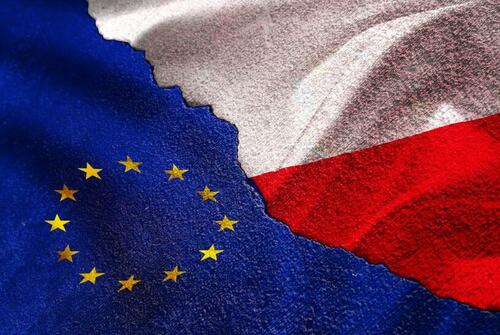Authored by Grzegorz Adamczyk via Remix News,
Poles are not happy with what the EU is selling…
Poles are opposed to the EU’s policy of banning combustion engine vehicles and to ideas circulating in the EU on forests, meat, clothes and a cashless economy, according to a poll carried out by the European Policy Research Center (CBPE)
The poll reports that 67 percent of respondents are opposed to an EU rule that will ban Europeans from registering combustion engine vehicles starting in 2035. The idea of the EU ban is supported by only 28 percent of Poles.
The opposition to the EU ban on such vehicles is seen across a broad spectrum of Polish society, including urban and rural inhabitants, as well as both those with higher degrees and those who have only finished high school.
The CPBE survey also asked respondents their views on the idea of transferring the power over forests to the EU, away from the member states. Over half of the respondents, 57 percent, opposed such an idea. Only 34 percent supported it. Once again, the opposition to the idea is similar across all age and socio-economic groups.
Another idea being discussed in the EU is limiting the consumption of meat to 16 kilograms per person, per year, as well as limiting the sale of clothes to eight new items per person.
Only 21 percent backed the meat consumption reduction target, with 76 percent opposed. The results were similar with regard to the purchase of new clothes, with 23 percent supporting it and 73 percent against.
Poles are also against a cashless economy. The European Parliament recently recommended that a digital euro be researched but not yet launched. Privacy advocates warn that a cashless society could have grave consequences for personal freedom, with authorities able to track in all transactions in real time. This may be a prerequisite to imposing strict limits on what people can buy, including clothing items and meat products. Digital currencies may also be tied to social credit scores relating to political opinions and social behavior, as they are in China.
Advocates for a cashless society within Brussels argue that digital currencies would limit the black market. However, 81 percent of Poles oppose getting rid of cash, with only 17 percent in favor.
Similar opposition to a cashless society can be seen in nations such as Austria, Switzerland and Germany. Last year, over 500,000 Austrians signed a petition calling for the right to use cash to be enshrined in the Austrian constitution. As a result, a referendum on the issue will be launched within the country. With a population of 8.9 million, the massive show of support for the right to pay with cash demonstrates the growing movement against digital money, including central bank digital currencies (CBDCs).
As Remix News previously reported, globalist institutions like the World Economic Forum have long lobbied for a cashless society and have routinely run articles such as “Why we should try to make cash obsolete,” “The benefits of a cashless society” and “Should cash be abolished?” Back in 2017, economist Joseph Stiglitz called for banning all paper currency in the United States, a position the WEF also positively reported on. Central banks across the world are also currently “leading the way” in the race to institute digital currencies. Although digital and physical currencies are expected to run in tandem for many, numerous globalist think tanks and economists are pushing for a complete phase-out of cash after an adjustment period.








